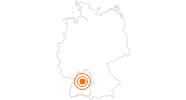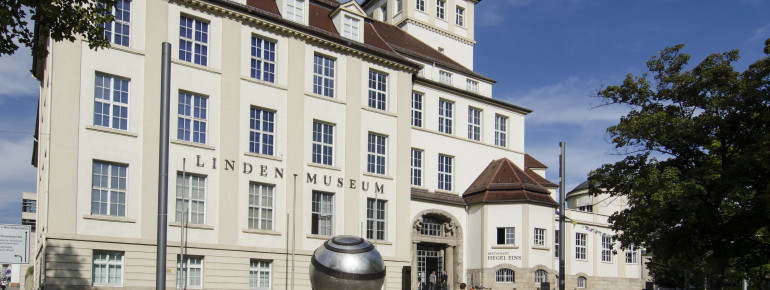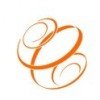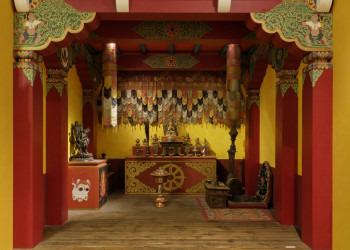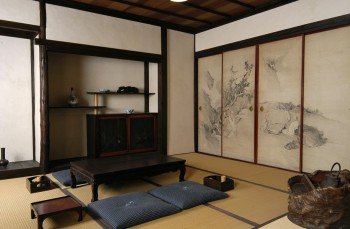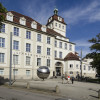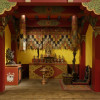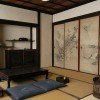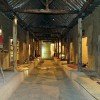Contents
Description
Linden Museum in Stuttgart is one of the major European ethnological museums. Besides its various special exhibitions, the museum features permanent exhibitions that centre around East Asia, South-/ South East Asia, and the Islamic Orient. Furthermore, it is home to top-class collections from Africa, Oceania, North and Latin America. Linden-Museum is a lively place of encounter with the cultures of the world.
Explore the Permanent Exhibition
The Orient Department introduces visitors to the culture and art of various regions of the Islamic world from the Near East to Pakistan. Its internationally important collections include metal work, the remarkable calligraphy works bequeathed to the museum by Annemarie Schimmel, ceramics, and architectural fragments. Separate parts of the exhibition present the literary world of Islam, the dichotomy between rural and urban life, and feudal aspects of traditional life. A reconstructed Afghan covered bazaar gives the visitor an feeling of the athmosphere of the Orient. The exhibition provides a dialogue with Islamic culture at a time when contemporary international politics urgently require an understanding of the differences between world cultures. To this end, the aim of the exhibition is to engender a respect towards the cultural achievements of Islam and encourage a broader acceptance and tolerance of Muslims.
The South and Southeast Asia section comprises the sections India (including ancient Afghanistan), Sri Lanka, continental Southeast Asia and Java/ Indonesia as well as Nepal and Tibet. Its collections are among the topmost in European museums. Religious art objects from ancient times till the recent past enable our visitors to overview the 2500 years of development and changes of the Hindu and Buddhist believes and rituals against their cultural/historic backgrounds in India and the neighbouring Asian countries. Also on display are topics like "Art and religion of the Jainas" (India) and "Cham"(Vietnam).
The Department of Far EasternArt highlights the material cultures of China and Japan. In recent years the department has enhanced its permanent exhibition galleries so that they include its spectacular pieces and new acquisitions. The art of China section includes a display of funeral objects such as ritual bronzes and figurative ceramics that elucidate the complex theme of ancient Chinese burial rites. Six thousand years of Chinese ceramic traditions are also on display, as well as paintings from the 17th to the 20th century, and art objects dating from the 14th to the 19th century. Scroll paintings and applied art objects embody the artistic heritage of Japan. A number of these items are on display in a reconstructed teahouse and a traditional domestic living room. One treasure of the department's collection is its famous collection of lacquer, urushi, objects, some Chinese examples of which date back 2500 years. The earliest Japanese pieces are some 400 years old. Fragile and light sensitive paintings and lacquer ware on display are periodically removed from the galleries for conservation reasons.
Historical Information
The Württemberg Association for Trade Geography established the museum, which was opened in 1911, as a space for its collections of evidence of art and everyday culture beyond European culture.
The Linden-Museum is named after the chairman of the association at the time, Karl Graf von Linden (1838 – 1910). Today, the Linden-Museum is one of the largest museums of ethnology in Europe. The broad collections with precious pieces of international importance comprise around 160 000 items from all large cultural regions on the planet. The visitor can obtain a deep insight into art and cultural history right up to the present day, as well as learn about everyday culture.
Interesting facts
- The day pass at Linden-Museum Stuttgart is €4 making it one of the 15 cheapest tourist Attractions in Germany.
How to get there
By bus
From the main station you can take bus no. 40 (direction Vogelsang) and no. 42 (direction Erwin-Schoettle-Platz); the bus stop "Linden-Museum/Olga-Hospital" is right in front of the Linden-Museum.
By car
From Stuttgart's main station please follow the signs to the Katharinenhospital, which is located on the right side of Kriegsbergstraße. Shortly after the Katharinenhospital, Kriegsbergstraße meets the Hegelplatz with the Linden-Museum on the right.
